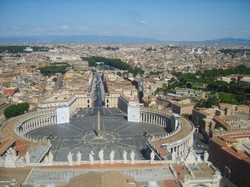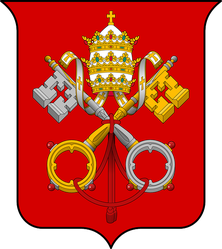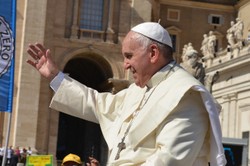There is great joy in the Catholic Church when a new pope is elected, countering the inevitable sadness at the death or, as happened recently, abdication of his predecessor. However, such an election should be a time for sober reflection, as a man is being chosen to take on a daunting task, standing in for Christ as his vicar, leading the Church through its always turbulent path. As Peter was a boatman, we use the image of the barque [ship] of Peter, being steered through stormy seas. Its captain requires skill, strength of character and a clear sense of where the ship is going.

The Role of the papacy
by frankbeswick
The papal role has evolved from its origins in Peter's confession of faith as the needs of the church changed over the centuries.
Blessed are the Peacemakers
Two days before I began to write this article news came through that the United States of America and Cuba had buried the hatchet and improved relations between two countries that for long wanted to bury the hatchet in each other's heads. Tucked away in the reports was the declaration that Pope Francis had played a vital role in negotiations to bring the two sides together. As usual in such situations, the Pope will not trumpet his successes. Quiet diplomacy for peace is an important element in the mission of Christ's vicar.
One little known historical fact is that in 1945 Pope Pius the Twelfth gathered together the papal diplomats, the first time such a gathering could be held after the war that ravaged Europe, and told them that now that the world had atomic weapons, an important element in their mission for the foreseeable future was to prevent nuclear war from happening. Since then the Vatican diplomatic service has worked quietly behind the scenes with this aim forefront in its mind.
Yet there are other, quieter examples. When Iran captured a British naval boat crew in the Persian Gulf tensions some years ago tensions were running high. The Vatican had got itself some kudos with Iran by opposing certain Western leaders' desire to invade the country, and it had kept lines of communication open with the ayatollahs. A peaceful release was negotiated, partly through Vatican efforts.
Yet keeping peace within the church is a long term effort. Religious people can be argumentative, often fractious, as I know from my years in theological college! They tend to have strong views, argue for them and get annoyed about important issues, because they take issues seriously, One of the roles of the papacy is to preserve church unity in an institution of now over a billion people. Not all popes have been good at this, although the biggest damage to unity has been done by people further down the ranks, such as Cardinal Humbert who caused the split with the Orthodox Church, without the pope's consent, or by rulers, such as Henry the Eighth.
Biography
 | The Church of Mercy "A magnificent book, bursting with profound spiritual insights, from a man who has quickly become one of the greatest spiritual teachers of our time." --James Martin, SJ, author... |
 | The Great Reformer: Francis and the Making of a Radical Pope A biography of Pope Francis that describes how this revolutionary thinker will use the power of his position to challenge and redirect one of the world's most formidable religio... |
The Teaching Role
Central to the papal job is teaching, and it is this area that arouses the most disagreement, especially on the contentious issue of infallibility. The world speaks of papal infallibility, though the church prefers the term infallibility. The difference is significant, as I will explain.
Many non-Catholics think that the pope can change Catholic teaching at will and that everyone has to agree with every word that he says. These are erroneous beliefs. Pope Francis recently explained to people that he cannot change church teaching, as he has no authority to do so. If church teaching were to change it would be a matter for a council of the church, not for just one man, however exalted his rank be. The Catholic line is that the pope in himself is as fallible as the next person, but that the church as a whole is guided by God in its pursuit of the truth. Therefore the pope's infallibility comes only when speaking the mind of the whole church on an issue of faith and morals.
Pope Benedict was unwilling to speak in an authoritarian way, and in his book, Jesus of Nazareth, he was at pains to state that no one was obliged to agree with him. He wanted to be taken on the strength of his ideas and his reasoning alone, and in this way he did the papacy a great service. As a teacher myself, I see the need for teachers to rely on ideas and reasoning rather than on authoritarian assertions, so I am at one with Benedict on this strategy.
Yet much of the teaching role is exercised in letters to the whole church, called encyclicals, and in speeches. The aim of these works is to address problems facing the church, and in common with teachers all over the world he will not be introducing new ideas but deepening understanding of older ones.
Supervising theologians is another part of the teaching role. As a layman I can write what I like without any sanction, but priests are subject to papal discipline to keep them in line with church teaching. The church cannot have just anyone speaking in its name.
The Teaching Role
 | Jesus of Nazareth: From the Baptism in the Jordan to the Transfiguration “This book is… my personal search ‘for the face of the Lord.’” —Benedict XVIIn this bold, momentous work, the pope—in his first book written as Benedict XVI—seeks to salvage the... |
Managing the Church
Yet another misconception held by non-Catholics is that the pope has day to day control over the church. He doesn't. The church is run by the bishops, each of whom runs his own diocese, but is supervised by archbishops and ultimately the pope. Here is something that might surprise some people. Suppose that a man applies to a bishop to be a priest, and the bishop refuses. The man cannot appeal to the pope. Church law is adamant that on this matter the local bishop's decision is final, and the pope cannot overrule him. The man will have to apply to another bishop.
The pope, however, appoints bishops. When doing this and appointing a bishop in, for example, Ireland, he will take advice from the Irish bishops and the papal ambassador, his nuncio, to Ireland. A short list of three will be sent to the pope, who makes the final decision. Bishops and priests can be dismissed by the pope, as some have been because of abuse.
Popes do not supervise local priests, that's the bishop's job, but they supervise bishops. They do this by having ad limina visits. Every few years, three is the general rule, the bishops in a country will have to see the pope and report to him. Archbishops and cardinals see him more regularly. On these visits issues are discussed and papal guidance given. In Ireland the previous pope responded to the abuse problems in the Irish church by ordering a visitation for the dioceses in the whole country, in which certain important cardinals would visit every diocese in Ireland.
Yet the trickiest task has proved to been controlling the Vatican administration. Pope Benedict abdicated after he realized he was too old and unwell to face this task. He was an expert theologian, but he realized that the church needed someone with administrative skills and the ability to control a difficult organization. In Francis the church got him. I do not think that Francis will write books like Benedict did, but he is spending time getting to grips with the sclerotic Vatican administration, and that's a job enough to keep him occupied. He has innovated by establishing a personal advisory council consisting of Cardinals from North, South and Central America, Europe, Asia, Africa, Australia, and one from the Vatican administration. Thus the whole Catholic world is represented among his advisers.
Besides all this the pope must speak for the church, dealing with world leaders and addressing world issues. As Christ's vicar on Earth he must address Christ's concerns, which include justice for the poor. This involves addressing the moral issues of the day and supervising the church's relief efforts. According to a recent UN report Christians are the people most likely to be undergoing persecution in our world, so the papacy must deal with the problems faced by persecuted Christians. At the same time it has to show care for non-Christians, as Pope Francis did recently when he sent aid to the Yazidi victims of Isis' atrocities, as well as to Catholic victims.
The Vatican
 | The Vatican: All the Paintings: The Complete Collection of Old Masters, Plus More than 300 Sculpt... In the same style, manner, and format as The Louvre: All the Paintings (Black Dog & Leventhal, 2011), every Old Master painting on display in the Vatican, as well as hundreds of... |
 | Vatican The home of the pope and the seat of the Holy See, the Vatican is a unique entity, a sovereign city-state that shelters some of most sacred treasures in the world within its hun... |
The qualities needed
What I have observed by studying church history is that no one who sought the papacy made a good pope. This is a job that no one should ever desire, but should accept humbly in trepidation.
Firstly the person appointed must be one of deep faith and personal holiness. He must have a thorough grasp of Theology and Scripture. As with all leaders, a vision for the future course of the institution's growth is vital. The ability to run a massive institution spread across the world is vital. He must be able to give pastoral guidance to the church, deal with world leaders and the leaders of other churches and religions in a positive and friendly way, yet he must be able to speak to crowds. He also has to be tough enough to deal with sometimes difficult and devious people. This means that he must not be naive where people are concerned, and as we have found with Pope Francis, he must be prepared to dismiss officials who are not performing to standard. A grasp of languages helps. It is a job that absorbs your whole life from morning to night, probably for the rest of your life.
No single person is perfect in all these ways. John Paul was an expert linguist,speaking twelve languages, and he could speak to crowds, but he was not as good a theologian as Benedict, who used to be his theological adviser. Benedict, however, struggled with relationships with crowds, but was an expert theological writer. Francis knows how to manage organizations, essential in one who has had to make reforms of the Vatican, but he is not as good with languages as John Paul and Benedict were. John Paul had the physical health for the job, whereas Benedict was challenged in that respect.
What is more, there are threats to the pope. Several early popes were martyred, and Isis have declared their intention to kill Pope Francis. While Islamic fundamentalism still exists, this threat will be real. Anyone who becomes pope must accept the prospect of assassination. The last attempt was in 1981 when John Paul was shot and wounded.
Finally, the job of pope carries no salary. His needs are met from a fund established for the purpose.
So big job, long hours, danger of assassination,no salary, to be taken up at an age when most people are retired.But the church believes that when God gives someone a vocation he provides the grace and strength required to do it, though this does not make the job easy, just able to be done. The papacy is a job that can only be taken for the love of God and others.
You might also like
Conclave: a reviewConclave is a film which covers the secretive and fascinating process of el...
Hope: a reviewHope is the autobiography of Pope Francis detailing his life from early child...



 Darkness over the Earth the skies darkened when Jesus was crucified23 days ago
Darkness over the Earth the skies darkened when Jesus was crucified23 days ago
 TheThousand Year Gardenon 11/26/2025
TheThousand Year Gardenon 11/26/2025
 Women of the Gospelson 10/11/2025
Women of the Gospelson 10/11/2025
 Religious Gardenson 08/25/2025
Religious Gardenson 08/25/2025



Comments
The Vatican workers commute, but do not need to go far.
Thank you for your comment below in answer to my previous observation and question.
Pope Francis calls Vatican City lodgings home even as he commutes -- ;-D -- to and from the Vatican.
Is that likewise with the other Vatican City inhabitants?
Or is it possible to inhabit Vatican City even as one journeys back and forth from a Rome-based job or a Rome component of a Vatican job?
No. Latin is for the clerics. The !ordinary workers use Italian. Retired people do not usually live in the Vatican, they tend to live in Rome.
Thank you for your comment below in answer to my previous observation and question.
It seems to me like Vatican people are bilingual in Italian and Latin. Would that be true of Vatican City people?
(Would everyone in Vatican City be current and retired Vatican workers?)
Officialndocumentsbare in Latin, but day to day discourse is in Italian. Mass can be either.
Thank you for your comment below in answer to my previous, same-day observation and question.
Some online sources equate Latin with all spoken and written languages among current Vatican and Vatican City residents. Other sources link Latin only with Church services.
Might Church services be in Italian sometimes and sometimes in Latin? Might conversations and meetings be in Italian or in Latin?
Polish, Latin (for theology) Italian (for the Vatican) Spanish, French, English, German,
Portuguese, Dutch, Russian, Ladin, and, i believe, Hungarian.
The third paragraph under your last subheading, The qualities needed, describes Pope John Paul II as speaking 12 languages.
Online sources identify different languages even as they merge about Latin and Polish.
Some sources even offer Pope John Paul II as placing Italian among his languages because of that, not Latin, being the language of the Vatican!
What languages would be the most spoken and the official one at Vatican and in Vatican City, and what would be the languages that Pope John Paul II knew?
I took the photo from the dome of St Peter's.
I suppose that had there been good will the problem of the schism could have been resolved.
frankbeswick, Thank you for the practical information, pretty picture and product line. In particular, I appreciate the coverage of Vatican artworks.
What is the location in the image next to your title?
Was there nothing that could have been done at the time to avert or then to cancel Cardinal Humbert de Moyenmoutier's misdeed?